Sasha Lane, best known for her performances in the critically acclaimed indie hits American Honey and The Miseducation of Cameron Post, now stars as Cassie in Daniel Isn’t Real, a psychological-horror directed by Adam Egypt Mortimer. The film also stars Miles Robbins as Luke, a troubled college-aged teen and Patrick Schwarzenegger as the eponymous Daniel, his returning imaginary friend. Outtake had the pleasure of speaking with Sasha Lane about her latest role, her approach to mental health, her career so far, her poetry and her relationship to art ahead of the film’s UK release.
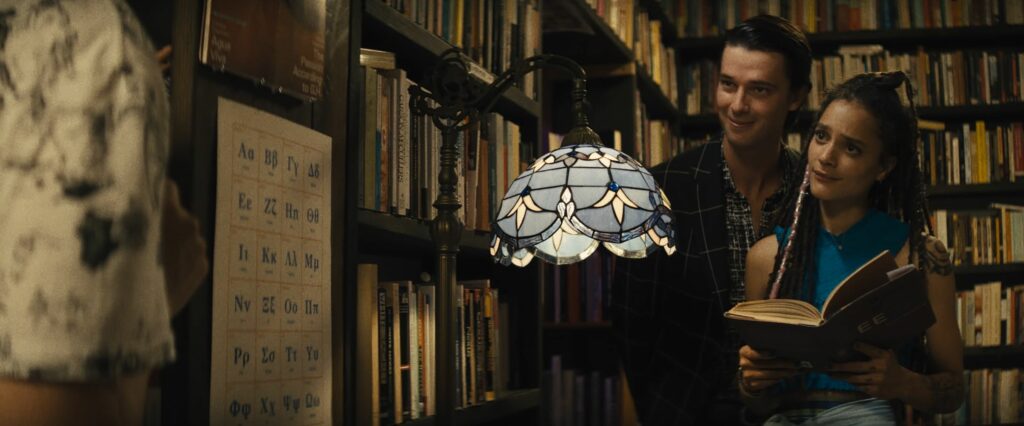
I wanted to start by asking, what was it that attracted you to this project?
Sasha Lane: I think just that I’m very big on mental illness. It’s a very big part of what I deal with day to day and I think it’s a hugely important thing for everyone to start to acknowledge and really learn about. So the fact that you have Luke dealing with his own [mental illness] while being a young male, that was important because that’s not usually portrayed much. And also, you get this whole dynamic between Luke, his mother and Daniel and how he copes with his mother’s illness and what it entails; that made me very intrigued from the jump. And talking to the director about it and hearing his passion behind it, it got me very excited.
Does that mean you approached this film more as an exploration of mental health rather than as a supernatural horror?
Yeah, that was definitely more my take on it.
What was it specifically about the character of Cassie that interested you?
I think it was a way of, you know, dealing with my own voice and dealing with my own issues, and kind of exploring how I cope with everyday life while still having my own problems. It was maybe bypassing the more involved side of me and looking from the inside out. And the way she needs her art to express herself and how she’s also able to really be balanced with her emotions when dealing with Luke, and helping him through his situation, often being just very strong herself. I mean, I just thought she was a great character to have a part of this film and so to be asked to play her, I was very down.
You’ve been rather open about your experience of mental health. Did you bring that experience to set and help Miles prepare for his role?
Yeah, we had a lot of rehearsal time before shooting, and a lot of exercises that Adam would put us through. One thing was, that scene where me and him are looking each other in the eyes while Patrick is screaming all types of things in [Miles’] face, trying to distract him. So I just shared a little bit of my story with him and was trying to teach him techniques to basically push out the voice, and to just stay in the moment with me, which was a very neat thing to be able to bring to our rehearsal.
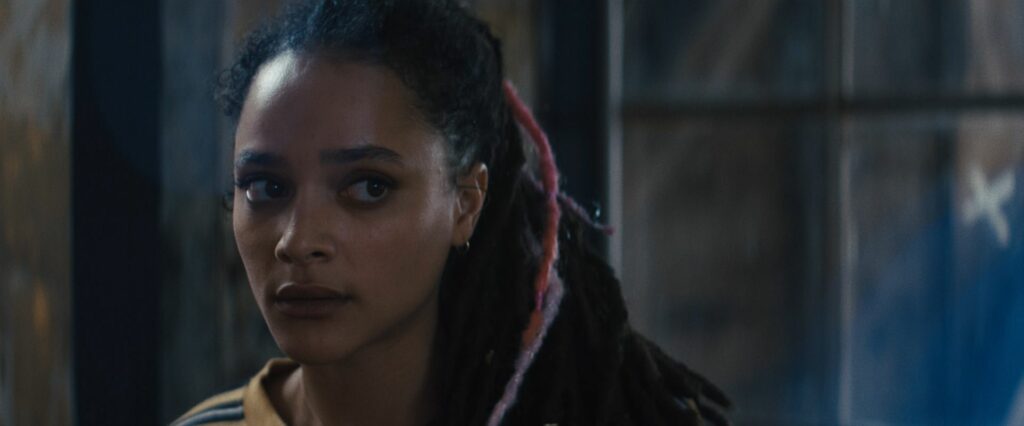
Does having that much time to rehearse change the way you approach a character?
It was definitely different for me. I’ve never had that much practice – I mean, we went through the entire script pretty much every day that we rehearsed, which is very different. I think it gives you a sense of confidence in your scene, because you kind of knew what to expect from the interactions with other characters, what kind of energy they tapped into and the feel you’d have in the room. So yeah, I think it is like an extra layer of confidence.
And did you have much input in how you created the character of Cassie? Was there much collaboration?
I think Adam [Egypt Mortimer] had a good idea of how he saw Cassie but, when it came to some days of shooting there’d be moments where… you know, her walking into Luke’s house when there’s clearly blood everywhere, that kind of thing – I was like, no way is she just going to go walking in there, into this stranger’s house. Like, how am I going to do that as a black female in 2018. There’s just no way, dude! There are moments like that where you know what is realistic in the interaction. And also with the fight scene, we were all very collaborative on that. You know, Cassie’s a small girl up against this demonic, strong, supernatural figure; she’s going to fight smart, she’s not just going to throw one hit and he’s out. We’ve got to throw things, push things, just think smartly about how she’s getting away, basically.
And what is it that you’re hoping that audiences take away from this film? Because it is a psychological horror, but it also deals with much bigger, more grounded themes.
I think each individual takes from it something different because from their own perspective, some will focus more on the horror or more on the fantasy, and others will focus on the psychological aspect; but I just hope that as a whole, they see that these two worlds in a way very much mirror themselves, and part of it is actually very real. When you do paint, who you are inside kind of manifests themselves physically and impacts how you interact. So hopefully this movie is something that can entertain but also something that they can learn from and relate to.
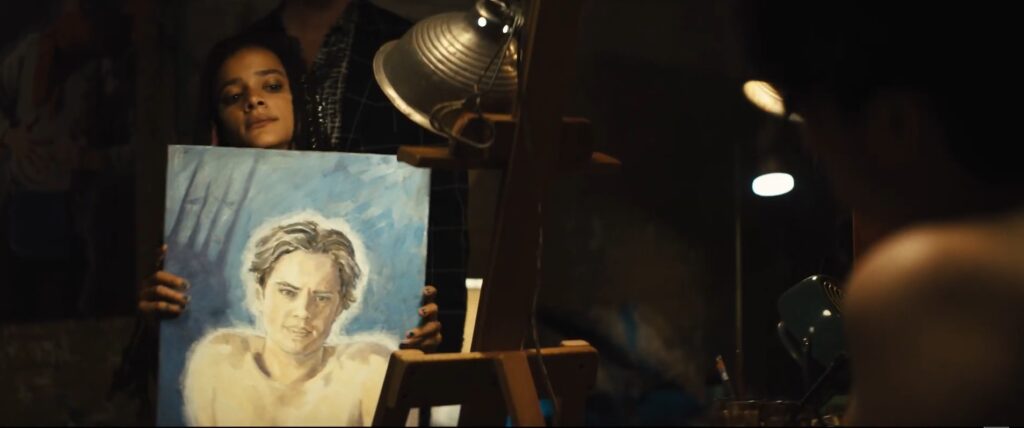
The film emphasises Cassie’s relationship to art, and that’s also what bridges her relationship with Luke. What is the significance of that?
I liked the way that you see she has these installations and these pieces of work that she ended up destroying. And it’s because she knew it wasn’t true, it was about her trying to unlock herself, and even she could acknowledge the fact that this is basically running away from her true potential. And then you see the portrait of her dad and it’s clear that that’s the most connected that she’s been with her art. Then when she paints Luke and paints the figure that she sees behind him, that’s her own outlet and it’s a way for her to connect with Luke and tell him, “I see you for who you are, because I’m being true to myself and I’m looking at you in your truest form.”
Is that something that you yourself embrace with acting or other forms of creativity?
Yeah, definitely. I mean, I think with acting, I’ve always taken a more natural approach. Just from the fact that I had no training. And then also, I write poetry and I paint, and it just allows for the realest moments that I have with myself, where I’m not being guarded and I’m just really letting myself explore my own mind with my own goals, and using art as a form of therapy.
Have you considered trying your hand at things outside of acting, like directing or writing, or other art forms?
I think besides film, the biggest thing for me is poetry. And so I’m really just praying that one day I can publish my poems, and that can be something that I relate to the world and continue to do. Not just for myself but to also kind of, in a way that’s just like film, share a bit of insight and hope people can relate to it. I would really love to publish my poems. I’m really hoping that comes into play at some point in life.
Shout out to any to any publishers!
Right! You know, look out for me guys, come my way.
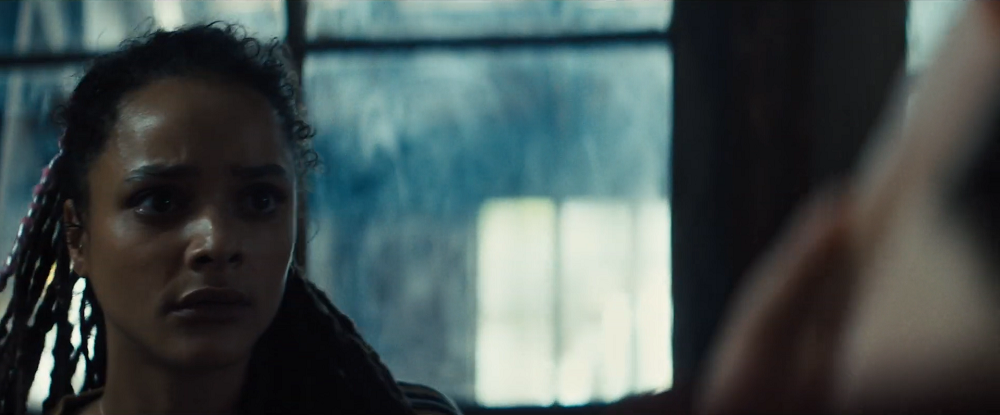
You had your start in indie films, but the last couple of films you’ve done have been genre films (Hellboy; Daniel Isn’t Real). Is that a transition you’re actively looking for?
I don’t really think it’s necessarily intentional, I think that as my life goes on, and as projects approach me… I’m just very open and I’m very picky, so it’s just a matter of what works and what I get.
I know this character has important echoes with your own struggles with mental health. Is that the kind of thing you look for when considering roles?
I like to find a way to personally connect with a role – like, is it something that I can put a real part of myself in? And I think that with that, there’s this dial where you’re turning one part of yourself up and the other ones down, and you’re exploring a different branch of yourself. I really feel like I have to connect in that way or else it just doesn’t work. It just feels a bit blank. I ask myself can I connect to this? Do I see what the message is? Do I feel like the people involved are going to do it justice? And in this case, with something dealing with mental health especially, you don’t want to take it lightly.
Of course. And the film feels like the director is considerate of the way that mental health is portrayed and handled. Did you feel that way when you first read the script?
I did, I did. I usually like to meet with the director beforehand or have some form of communication with them, because that’s s a big factor in my final decision, deciding to get involved or not. He had a lot of passion behind him, and he’d put a lot of thought into what he was doing and what he wanted to accomplish. I think that’s what helped give me confidence in the film and make it an enjoyable experience.
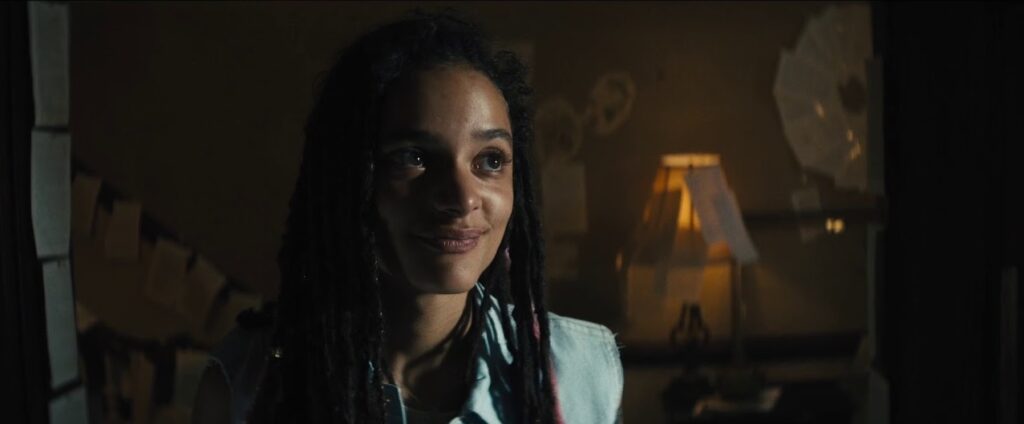
And I imagine that with all the rehearsal time, your castmates were also an important factor in your experience.
Oh, definitely. They were incredible in their roles; I think they were the perfect fit. I think Adam [Egypt Mortimer] did a really good job of choosing who he did, and the energy behind Patrick [Schwarzenegger] playing Daniel, he tapped into that so well. And Miles [Robbins] too, and him shifting between Luke and Daniel created a very natural energy and tension that really made the performance. It made it seem right and solid. I really loved working with them.
Did you have any familiarity with the novel from which this is drawn?
I actually hadn’t read it. I have a family friend and her mum, if I do any film that’s based off of a book, she reads it on tells me about it as I’m filming. She’ll update me on it and it’s actually quite adorable. But it was cool to share the differences with her, and also hear the similarities and go through it with her. I usually like to stick to what I know it to be and what I build from there, and what it is for the director and the writer and all of that. But to know the background of the book is obviously beneficial, since the film stems from it.
You’ve got a new series coming up, Utopia. Can you talk about that?
Yeah, I’m very excited about that one. I feel very attached to it; it’s kind of something that I was really hoping would come into my life. And it being TV, you know, that’s a big deal. As far as you know, hopefully, you will be attached to this for a very long time and I think it’s really cool that I can maybe continue to explore that character. I just think it’s going to be a really sick project.
And are there any other projects that we can look out for in the near future?
I’m not really sure if I can say… but I am excited to jump into a few new thing this year, so I guess we shall see.
Daniel Isn’t Real releases in UK Cinemas 7th February, and on Blu-ray and Digital HD on 10th February.
